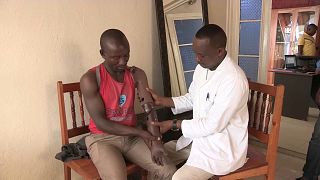Democratic Republic of Congo
Chickens wander around the courtyard from which familiar urban music emanates. Ten years after their glory days, Staff Benda Bilili dream of returning to the limelight and claim all the fruits of their former success, even if it means falling out with those who made them known.
In the early 2010s, these penniless, disabled Congolese musicians, living on the streets and riding in outdated wheelchairs, turned rumba upside down, set European venues ablaze and wowed the Cannes Film Festival.
Their style was unique, the life of Ricky, Coco, Theo, Djunana... overwhelming. A first album, "Très très fort", was released in 2009, another, "Bouger le monde", followed in 2012. Beyond Europe, they gave concerts in Japan, Australia, the United States ...
Then the beautiful story ends in 2013. The group breaks up, the end of a tour is canceled.
"We were not really separated, there was a bit of misunderstanding," wants to believe today Roger, a former street kid who, while being able-bodied, joined the group in its early days, playing a funny little instrument cobbled together from a tin can.
In 2011, between tours, Roger described how everything had changed for him. "Life is good," he said. Now, at 35 and with six children, "it's hard."
After buying houses, clothes, cars, the money from tours and records melted away, life became difficult again for everyone.
About four years ago, on the advice of the head of a humanitarian NGO, they "reunited". He "brought us together, made us play together", explains Theo, one of the singers of the group, who met with all the other members at the home of their leader, Ricky.
The old leader is 70 years old now. His look is wary, but he assures that he has the energy to resume the thread of the abruptly stopped adventure.
Every Thursday, they meet there, in Ndjili, a working-class district of Kinshasa, in the shade of a tarpaulin stretched over the courtyard, to create new songs, to rehearse, to practice.
A mural depicts Ricky in his heyday. One of the latest songs is about Covid, the pandemic and containment. Lingala lyrics flow, neighbors drawn to the music push through the corrugated iron gate.
"Effacer le tableau"
A new album, "Effacer le tableau," was released, but received little attention. "We would like to make a new documentary," so we can tell the world that "Staff Benda Bilili is back," says Live Mindanda, the group's public relations officer.
But the group also intends to fight for its share of the revenues from the film that made them famous, "Benda Bilili", presented in 2010 in the documentary category at the Cannes Film Festival. Since then, they have received nothing from theatrical screenings and admissions, they say.
"They are begging, while they have rights that can change their lives," says Live Mindanda.
Roger, Ricky and the others swear they are not at war with anyone. They do not all agree on the procedure to follow to get the money back. "But music is one thing, our rights are another," says Theo.
"We are going to assign the producers in front of the commercial court of Paris, and to ask for damages", explains the lawyer now in charge of carrying their file in justice, Me Mizou Bilongo Nsanda.
Among the directors and producers targeted, Renaud Barret explains that he himself did not receive his due until very late, after nearly ten years of conflict between distributors. About 25,000 euros, he says.
The contract provided that Staff Benda Bilili would receive 10% of the receipts. "We're going to give them their check, of course," says the French director, author of several other documentaries on Kinshasa, the sprawling city that takes you in its whirlwind of music and street art.
AFP













02:20
France: Avignon Festival celebrates Egyptian diva Umm Kulthum
01:07
DRC: More than 300,000 civil servants eligible to new retirement plan
01:01
Trial of DRC's former Justice Minister Constant Mutamba postponed for two weeks
02:19
Thriving, not just surviving: Gloria Gaynor releases new EP
Go to video
Angélique Kidjo makes history as first black African artist on Hollywood Walk of Fame
00:55
The Democratic Republic of Congo celebrates the centenary of Patrice Lumumba's birth